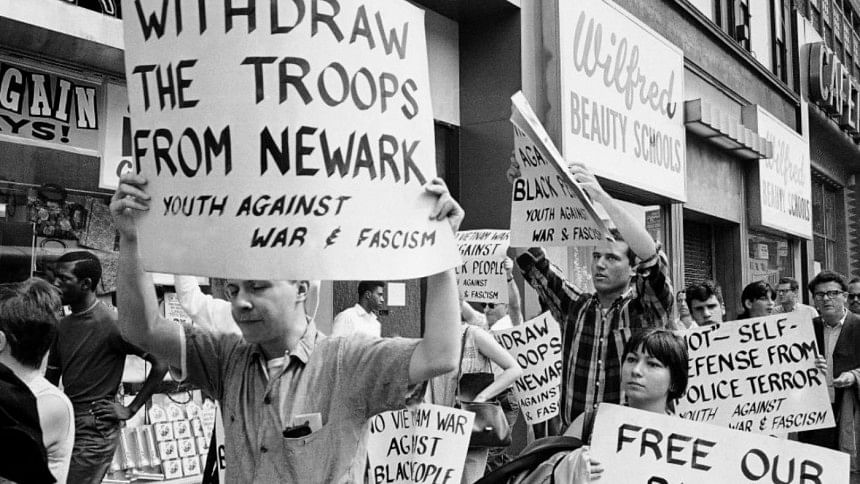When shall we overcome?

In 1967, riots erupted in cities throughout the United States, from Newark, New Jersey, to Detroit and Minneapolis in the Midwest—all two years after the Watts neighbourhood of Los Angeles exploded in violence. In response, President Lyndon B Johnson appointed a commission, headed by Illinois Governor Otto Kerner, to investigate the causes and propose measures to address them. Fifty years ago, the National Advisory Commission on Civil Disorders (more widely known as the Kerner Commission), issued its report, providing a stark account of the conditions in America that had led to the disorders.
The Kerner Commission described a country in which African-Americans faced systematic discrimination, suffered from inadequate education and housing, and lacked access to economic opportunities. For them, there was no American dream. The root cause was "the racial attitude and behaviour of white Americans toward black Americans. Race prejudice has shaped our history decisively; it now threatens to affect our future."
I was part of a group convened by the Eisenhower Foundation to assess what progress had been made in the subsequent half-century. Sadly, the Kerner Commission report's most famous line— "Our Nation is moving toward two societies, one black, one white—separate and unequal"—still rings true.
The just-published book based on our efforts, Healing Our Divided Society: Investing in America Fifty Years After the Kerner Report, edited by Fred Harris and Alan Curtis, makes for bleak reading. As I wrote in my chapter, "Some problematic areas identified in the Kerner Report have gotten better (participation in politics and government by black Americans—symbolised by the election of a black president), some have stayed the same (education and employment disparities), and some have gotten worse (wealth and income inequality)." Other chapters discuss one of the most disturbing aspects of America's racial inequality: inequality in securing access to justice, reinforced by a system of mass incarceration largely targeted at African-Americans.
There is no doubt that the civil rights movement of a half-century ago made a difference. A variety of overt forms of discrimination were made illegal. Societal norms changed. But rooting out deep-seated and institutional racism has proven difficult. Worse, President Donald Trump has exploited this racism and fanned the flames of bigotry.
The core message of the new report reflects the great insight of the civil rights leader Martin Luther King, Jr: achieving economic justice for African-Americans cannot be separated from achieving economic opportunities for all Americans. King called his August 1963 march on Washington, which I joined and at which he delivered his ringing, unforgettable "I Have a Dream" speech, a march for jobs and freedom. And yet the economic divide in the US has grown much wider, with devastating effects on those without a college education, a group that includes almost three-quarters of African-Americans.
Beyond this, discrimination is rampant, if often hidden. America's financial sector targeted African-Americans for exploitation, especially in the years before the financial crisis, selling them volatile products with high fees that could, and did, explode. Thousands lost their homes, and in the end, the disparity in wealth, already large, increased even more. One leading bank, Wells Fargo, paid huge fines for charging higher interest rates to African-American and Latino borrowers; but no one was really held accountable for the many other abuses. Almost a half-century after the enactment of anti-discrimination laws, racism, greed, and market power still work together to the disadvantage of African-Americans.
There are, however, several reasons for hope. First, our understanding of discrimination is far better. Back then, the Nobel laureate economist Gary Becker could write that in a competitive market, discrimination was impossible; the market would bid up the wage of anyone who was underpaid. Today, we understand that the market is rife with imperfections—including imperfections of information and competition—that provide ample opportunity for discrimination and exploitation.
Moreover, we now recognise that the US is paying a high price for inequality, and an especially high price for its racial inequality. A society marked by such divisions will not be a beacon to the world, and its economy will not flourish. The real strength of the US is not its military power but its soft power, which has been badly eroded not just by Trump, but also by persistent racial discrimination. Everyone will lose if it is not addressed.
The most promising sign is the outpouring of activism, especially from young people, who realise that it is high time that the US lives up to its ideals, so nobly expressed in its Declaration of Independence, that all men are created equal. A century and a half after the abolition of slavery, the legacy of that system lingers. It took a century to enact legislation ensuring equal rights; but today, Republican-controlled courts and politicians often renege on that commitment.
As I concluded my chapter, "An alternative world is possible. But 50 years of struggle has shown us how difficult it is to achieve that alternative vision." Further progress will require determination, sustained by the faith expressed in the immortal words of the spiritual that became the hymn of the civil rights movement: "We shall overcome."
Joseph E Stiglitz is the winner of the 2001 Nobel Memorial Prize in Economic Sciences. His most recent book is Globalization and its Discontents Revisited: Anti-Globalization in the Era of Trump.
Copyright: Project Syndicate, 2018.
www.project-syndicate.org
(Exclusive to The Daily Star)





Comments